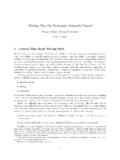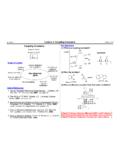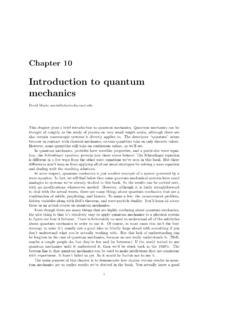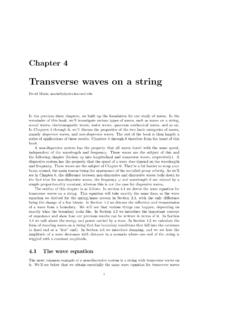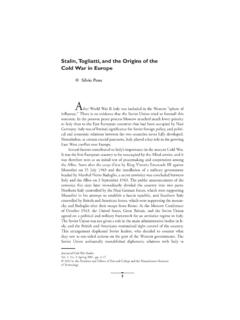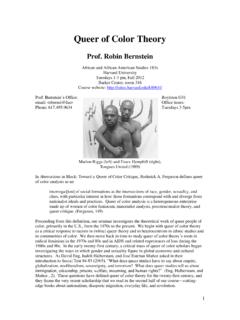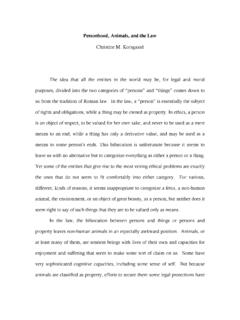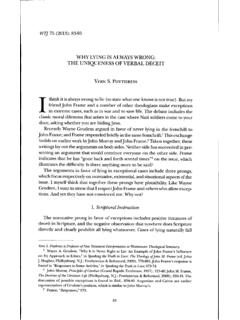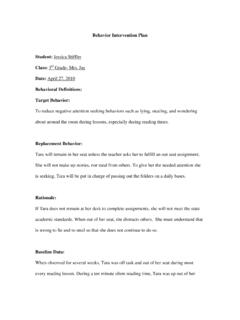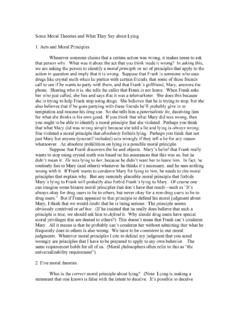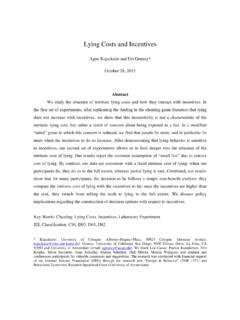Transcription of What’s Wrong With Lying? Christine M. Korsgaard …
1 What s Wrong with lying ? Christine M. Korsgaard harvard university The question I am going to discuss in this paper is: Why is it Wrong to tell lies? I am going to discuss three reasons moral philosophers have proposed in answer to this question. I will begin by saying quickly what they are. Intuitionists think that lying is Wrong just because it is lying , and for no further reason. Consequentialists think that lying is Wrong because it has harmful consequences. And Kantians think lying is Wrong because it violates the autonomy of the person to whom you lie. Before I begin discussing these three views, I want to explain why I think that this question is important. Almost everyone thinks that lying is Wrong , that is, that there is a general moral presumption against it. But almost no one thinks that lying is always Wrong : most of us believe that there are some occasions when a lie is justified or even obligatory.
2 Now what this suggests is that lying is not Wrong simply, but that it is Wrong for some further reason, and so that we can give an account of what is Wrong with it. For if lying is Wrong for a reason, then it will be Wrong only on those occasions when that reason holds. But there will also be occasions when it is not Wrong : occasions when the reason either does not hold, or is overridden. If this is correct, it is of great practical importance, as well as theoretical interest, to know why lying is Wrong . Only if you know the reason why lying is Wrong will you know when that reason holds, and only if you know when the reason holds will you know when it is Wrong to lie, and when it is not. And of course this illustrates a more general point. We need to know what is behind our ordinary moral principles in order Korsgaard : What s Wrong with lying ? 2 to apply those principles correctly.
3 What I want to discuss, then, is why lying is Wrong , with a view to determining when it is Wrong , and when it is not. Proponents of the first view I am going to discuss would be uncomfortable with some of the remarks I have just made. From the late seventeenth century on there has been a school of moral thought according to which moral principles like lying is Wrong killing is Wrong being unfaithful to your friends is Wrong are self-evident truths for which no further reason can be given. These philosophers are called intuitionists, because they believe we know moral truths through direct rational According to intuitionists, moral principles are simply obvious to any rational person who is thinking clearly. They are obvious in the way that it is obvious that, say, 2+2=4, or in the way that it is obvious that you cannot be in two places at the same time. You can tell that these things are so just by thinking.
4 Now you will see right away that according to this view, there is not much we can say about what is Wrong with lying , any more than there is much we can say about why 2+2=4 or why you cannot be in two places at the same time. These are not things for which we normally give reasons, because they are too basic. Some philosophers say that once someone fully understands what these statements mean, he will see immediately that the statements must be true. And the intuitionists say this sort of thing about lying : once you really understand what it is, you will see immediately that it must be Wrong . So on this view there is no real answer to the question, What s Wrong with lying ? The wrongness of lying is basic. The intuitionist says that what is Wrong with lying is just that it is lying . You might think that this means that intuitionists are committed to the view that lying is always Wrong , or absolutely Wrong .
5 But this is not what intuitionists believe. Most Korsgaard : What s Wrong with lying ? 3 intuitionists distinguish between an action being Wrong prima facie and it being Wrong all things considered. ii To say that something is Wrong prima facie is to say that it is Wrong if everything else is equal. Prima facie, lying is always Wrong , but all things considered it is not. This is because sometimes telling the truth would require violating one of your other duties. By telling the truth, you may violate a promise to keep a secret; or if the truth hurts, you may violate the duty to be merciful; or if the truth kills, you may violate the duty to preserve life. When two duties conflict, we must violate one of them. If we must violate the duty to tell the truth, lying is not Wrong all things considered, although it is still Wrong prima facie.
6 The intuitionist, then, would be uncomfortable with one of the things I said when I described my project at the beginning. I suggested that lying must be Wrong for a reason, and the occasions when it is not Wrong must be the occasions when the reason either does not hold or is overridden. Now the intuitionist thinks that lying is not Wrong for any reason except the fact that it is lying . So the reason against lying is always in force. But the intuitionist would agree that the reason can be overridden, when some more important duty is involved in the case. Let me point out some advantages and disadvantages of the intuitionist position before I go on. An advantage is that it seems to coincide with common sense views of morality. Many people would agree with the claim that you should not lie unless telling the truth violates some more important duty. And many people would agree with the intuitionist s model of how we make moral decisions - by balancing and weighing various moral principles.
7 Also, many people would endorse the following claim: even when lying is justified, there is something morally distasteful and regrettable about it. When you tell a justified lie, you usually feel some of the same emotions you feel when you do something Korsgaard : What s Wrong with lying ? 4 Wrong . You feel guilty towards the person to whom you lie and you might even want to apologize when the need for deception is over. The intuitionist tries to explain these feelings by appealing to the idea that although the lie is not Wrong all things considered, it is still prima facie Wrong . He says this is why you still feel bad: because you have done something that is prima facie Wrong . The disadvantage of the intuitionist view is that it can tell us nothing about when lying is Wrong all things considered and when the duty to tell the truth is outweighed by another duty.
8 And this is because we can give no account of why various kinds of actions are right or Wrong . If there are reasons for our duties we can weigh the importance of the duties by comparing the reasons for them. But the intuitionist believes that there is no method for resolving conflicts of duty. An intuitionist thinks that if you are well brought up and have life experience you will become a good judge about which of two conflicting duties is the more important. Now this too may coincide with our common sense views about morality. But the need to depend on experience and judgment may be one of the things about common sense morality that we regret. We might have hoped that moral philosophy could help us to resolve such conflicts. More important is the fact that the view makes it mysterious what we are doing when we compare the importance of two duties. If there is no further reason why lying is Wrong or killing is Wrong , then how can there be a reason why killing is worse than lying ?
9 So it is not really clear what it is that the person who is good at weighing the importance of different duties is a good judge of. The problem is not only that the intuitionist lacks a method for resolving moral conflicts, but also that it is unclear what the method would tell you if you did have it. Korsgaard : What s Wrong with lying ? 5 Now I am going to devote the rest of my discussion to two views according to which there is something a little more helpful to say about what is Wrong with lying , views according to which we can give an account of why lying is Wrong . To keep things simple, I am going to focus on a particular kind of lie. The occasions on which many lies are told are such that those lies are Wrong in a variety of ways. Malicious lies, told in order to hurt people, or lies told in the service of concealing crimes or other Wrong actions, are Wrong in more than one way, and may be more seriously Wrong because of the role that they play in evil projects than they are just as lies.
10 I want to know what is Wrong , if anything, with lies just as such, so I want to avoid these complications. There are two kinds of lies that even decent and morally good people are regularly tempted to tell. These are lies told to protect your privacy, and benevolent lies: lies told for good purposes. Because I am not convinced that lies told to protect your privacy are Wrong , I am going to focus on the case of benevolent lies. More specifically still, I am going to focus on the two-person case. I am not going to consider the kind of case in which, say, you lie to me in order to protect a third party. That case too may introduce complicating factors. I am going to discuss the case of paternalistic lies: the case where you lie to me for my own good, because you think it would be better for me to believe, or perhaps just to hear, something other than the truth. Two things make this the best case for us to think about.
